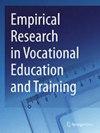职业院校学生对五个科目的目标结构、掌握目标和自我效能感之间的关系--实践相关性是潜在的中介因素
IF 3.1
Q2 EDUCATION & EDUCATIONAL RESEARCH
Empirical Research in Vocational Education and Training
Pub Date : 2019-06-04
DOI:10.1186/s40461-019-0084-0
引用次数: 0
摘要
目标结构代表了有助于激发学生学习动机的课堂特征。然而,目标结构及其与学生学习动机的关系尚未在职业教育中得到研究。本研究旨在填补这一空白。我们以奥地利 1434 名职业学生(64.3% 为女生)为样本,调查了掌握目标结构与掌握目标和自我效能这两种动机结果之间的关系,涉及五个科目(会计、工商管理、英语、德语和数学)。此外,我们还检验了掌握目标与这两种动机结果之间的关系是否(部分)受学生对这些科目教学的实际意义的看法的影响。多层次模型的结果显示,在所有学科中,目标结构在学生个体层面上与掌握目标呈正相关,而在英语课堂层面上,目标结构与掌握目标也呈正相关。在这两个层面上,掌握目标结构对掌握目标的间接影响(以实际相关性为中介)在多个学科上都具有显著的统计学意义。此外,在会计学科的学生个体层面和数学学科的课堂层面,掌握目标结构与自我效能呈正相关。在数学课堂层面上,实际相关性对掌握目标结构对自我效能感的影响起着中介作用。本文讨论了研究结果对职业教育研究和教育实践的启示。本文章由计算机程序翻译,如有差异,请以英文原文为准。
Associations between vocational students’ perceptions of goal structures, mastery goals, and self-efficacy in five subjects—practical relevance as a potential mediator
Goal structures represent classroom characteristics that are supportive of students’ motivation. However, goal structures and their relations with students’ motivation have not yet been investigated in the context of vocational education. The present study aims at closing this gap. We investigated the relation between mastery goal structures and the two motivational outcomes mastery goals and self-efficacy in a sample of 1434 Austrian vocational students (64.3% female) in five subjects (accounting, business administration, English, German, and mathematics). Furthermore, we tested whether the relation between mastery goals and these two motivational outcomes is (partially) mediated by students’ perceptions of the practical relevance of instruction in these subjects. Results from multilevel models revealed that goal structures were positively related to mastery goals at the individual student level for all subjects, and for English at the classroom level as well. At both levels, the indirect effect of mastery goal structures on mastery goals mediated by practical relevance was statistically significant for several subjects. In addition, mastery goal structures were positively related to self-efficacy at the individual student level in accounting and at the classroom level in mathematics. Practical relevance mediated the effect of mastery goal structures on self-efficacy in mathematics at the classroom level. Implications of the results for research in vocational education and educational practice are discussed.
求助全文
通过发布文献求助,成功后即可免费获取论文全文。
去求助
来源期刊

Empirical Research in Vocational Education and Training
Social Sciences-Education
CiteScore
3.40
自引率
7.70%
发文量
9
审稿时长
13 weeks
期刊介绍:
The main focus of this journal is to provide a platform for original empirical investigations in the field of professional, vocational and technical education, comparing the effectiveness, efficiency and equity of different vocational education systems at the school, company and systemic level. The journal fills a gap in the existing literature focusing on empirically-oriented academic research and stimulating the interest in strengthening the vocational part of the educational system, both at the basic and higher education level.
 求助内容:
求助内容: 应助结果提醒方式:
应助结果提醒方式:


